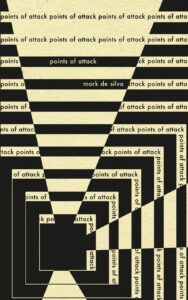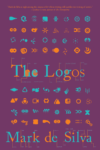
[Clash Books; 2020]
“ . . . [T]he desire to feel a certain way about oneself or the world perverts the desire to know,” writes Mark de Silva on the last page of his electric book of short essays, Points of Attack. I start with that sentence — aimed at that bugbear in literature “sentimentality” — because the pressurized contents of the collection all have been pointing to such a naked declaration. The desire to feel a certain way . . . why we use social media, why we use certain people for certain outings, why we engorge ourselves on or starve ourselves of news — all these are related. A book like this will upset the fractious factions on the left and right, both of which will turn on the author and shout, Who do you think you are? De Silva’s needling them to such a query may be the first step away from the fixed ideologies they use to scold each other.
The subjects in Points of Attack range from terrorism, concern for animals, and the destructive force that is climate change, to war, sports, collecting, language, and the commercial and aesthetic problems inherent in art and architecture, particularly artworks of a literary nature.
De Silva, who holds a PhD in philosophy, is an accomplished novelist. His Square Wave came out in 2016, and he has a one-thousand-page novel, The Logos, due out next year. He provides biting commentary on two of the most entrenched writers of our time: David Foster Wallace and Jonathan Franzen. The former, de Silva claims, is mostly style, his intricate prose the correct mode of expression for his portmanteau of feelings. He also finds Wallace “captive to the culture . . . so . . . others could come to understand their own condition through reflecting on his work.” Franzen, on the other hand, is void of style and his latest efforts, says de Silva, feel “dated upon their release.” These pronouncements are grounded in stern enough aesthetic criteria: “an artwork’s vitality, particularly for future generations, may have far more to do with properties like ambiguity, richness, and even outright contradiction than with cogent summations of a historical moment.” Similarly, the recent autofiction trend will not do for de Silva. Those books:
seem premised on the notion that if it is our fate to embroider and even fabricate our pasts, insulating our preferred identities from the sharp edges of actuality, we ought to openly acknowledge our fraudulence and fantasize with purpose, even panache.
This harkens to William Gaddis’s critique of modern fiction writing: “They think if something happened to them that it’s interesting because it happened to them.” Where there is more imagination there is less a risk of seeming counterfeit to the art itself (when trying to “look good” on the ego side of the page) — even autofiction’s shaky hold on the last decade was fueled more by Sebald’s anthropological stylings than his narrators’ vague resemblance to himself. It is no surprise that de Silva upholds Jacques Roubaud’s ambiguous (and avant-garde) totem The Great Fire of London over the quotidian and unrhythmic crawl of Knausgaard’s or Ben Lerner’s prose.
De Silva is equally adept at peering into the questions of sports, weighing the ethics of watching boxing while giving a short taxonomy to the pugilists’ backgrounds and why they choose such a savage employment, before landing at a philosopher’s crossroads: “the mere fact that someone freely chooses to harm himself cannot morally cleanse my aiding his cause or enjoying its fulfillment,” but “there are circumstances in which I would be blameless for doing so, even virtuous,” as in the case of assisted suicide for the terminally ill. Some pages later he dives into talk of the heart, which he aphoristically calls “a repository of wisdom, but in the form of feeling not thought.” He finds a double meaning in the term “follow one’s heart,” something magnified by his two ways of thinking about the heart — one being as “the inscrutable nature of desire” and the other being the “moral sense,” with “feeling as the affective emissary of practical reason, to be consulted just when one is besieged by fancy.” De Silva’s maxim-ist writing is the dominant mode on display. While de Silva’s diction and syntax don’t burst their buckles, his fictional mindset has added a certain precision to his scruples — as William Gass averred, so much of philosophy is fiction, both of whose makers are “obsessed with language, and make themselves up out of concepts.”
De Silva is a latter-day Diogenes, debasing our current coinage and calling out the hypocrisies that too many journalists blithely ignore to keep their paychecks regular, like the “Silicon Valley businessmen who have starred in the dramatic crises of our moment,” but who latch onto Zen Buddhism retreats for themselves and their employees, keeping their corporate minds serene while they rape the earth and pillage the hearts and minds of its overworked majority, whose one happiness is getting a day off from two jobs to spend some time with their children. In terms of the book’s political components, there’s little Noam Chomsky would disagree with — de Silva is most concerned with the ecological crisis, but also critical of the growing tendency for snap judgements, especially those in the intellectual classes (the NYRB), as he evidences the rageful reactions to the book What Darwin Got Wrong. Indeed, de Silva’s concerns go beyond those of NPR and the NYTimes op-ed pages, whose triviality he openly makes war on, ridiculing those enamored of the real estate market and society weddings or the best places for brunch in Brooklyn, those who hate Amazon but have stock in GE.
These essays or pieces or feuilletons or Barthesian mythologies — whatever you want to call them — are the correct form for our age: won’t a five-hundred-page, three-pound, university press book on ethics get ten or twenty pages of itself read and then slowly migrate from one household place to another (in descending popularity), before it ends up in a box donated to the Salvation Army? And we need books like this now, which give us three minutes of compressed delight of a less counterfeit life before that next text or email downshifts our most receptive mood of the day.
Greg Gerke’s work has appeared in Tin House, Film Quarterly, The Kenyon Review, and other publications. See What I See, a book of essays, and, Especially the Bad Things, stories, were published by Splice. An expanded version of See What I See will come out in 2021 with Zerogram Press.
This post may contain affiliate links.







